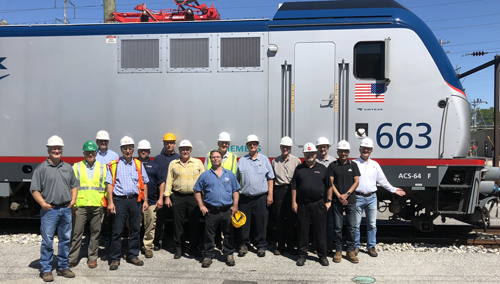
A former high school teacher, Peter Scholtens now heads Integrity Rail Products, Hamilton, Ontario, Canada.
The fact that Peter Scholtens played with model trains as a child and stops at rail crossings as an adult does little to explain how and why he is today an independent manufacturers’ representative serving the rail industry in North America. Rather, he can point to an entrepreneurial spirit coupled with a desire to do what he truly wants to do for the rest of his life for bringing him today to where he heads Integrity Rail Products.
Founded two years ago and headquartered in Hamilton, Ontario, Canada, the agency’s products include locomotive traction control systems, locomotive electrical components, and rail-cutting tools.
A visit to the agency website (www.integrityrailproducts.com) educates visitors to the agency’s mission which is “…to solve problems in the North American rail industry by bringing customers and suppliers together. We do this by attending industry events, keeping in communication with our customers, and bringing their issues to the suppliers that we represent.”
Scholtens, who exited college with a degree in biology, explains that his journey to become a rep was a rather circuitous one. “I began as a high school teacher. I was approaching 40 and I felt I had mastered that craft and going into administration didn’t interest me. I couldn’t really see myself teaching for the next 20 years. I was feeling antsy when I decided to try my hand at starting my own business — a decision that probably caused my family to pull out their hair.”
That decision to go off on his own didn’t exactly develop out of a vacuum. According to Scholtens,” My father, who was a physician, was one of seven brothers — several of whom were entrepreneurs or were in sales.”
Armed with that entrepreneurial DNA, Scholtens began his sales career working in a nursery selling trees and shrubs. He experienced some immediate differences from his previous career including a dip in salary, and instead of working 9 a.m.-3:30 p.m., his hours were more like 7:30 a.m.-5 p.m. — not to mention not having the summers off. “When people asked me if I missed teaching, my answer was always, ‘Yes, right around July 1.’”
Moving on From Trees and Shrubs
He explains that the move from trees and shrubs to something different occurred following a conversation with a brother who was in sales. “His advice to me was if you don’t mind traveling, the margins in industrial sales are good and you can make a good salary.”
Coincidentally, at the same time the father of one of his friends was a sales engineer and was looking for someone to partner with. “This man’s business was just taking off so I thought that might be a good place to start. I made an appointment with him for a breakfast meeting — not realizing he wasn’t a morning person. He never showed up for the meeting.” Moving on from that false start, Scholtens was hired and filled a position for five years working, networking and selling in the rail industry. “I started with that agency not knowing anything about the rail industry. I learned very quickly what a fascinating industry it is. In addition, it’s a great place for a rep to be positioned. I saw an opportunity to bring products to customers and there were any number of places I saw where a rep could thrive. It’s the ideal niche industry where a manufacturer can have a product that he wants to bring to market, but he can’t justify having someone serving as a direct salesperson. On top of that, it’s ideal to be a rep in Canada where U.S.-based companies are looking for some exposure but can’t justify having a direct salesperson. That experience provided me with an opportunity to get acquainted with the rail industry but ultimately I reached a point where I didn’t think the company was going to grow.”
In making the move from that agency to one of his own, Scholtens explains, “A friend of mine who was a rep in the fabrication and machining industry convinced me that I should take advantage of the relationships I had already built. He said since I had the stomach and intestinal fortitude for it, not to mention faith in myself, I should give it a go. And, that’s exactly what I did.”

As his membership in MANA shows, Scholtens is a big believer in participating in industry associations. The above picture of the Locomotive Maintenance Officers’ Association was taken during a tour of an Amtrak facility in Wilmington, Delaware. According to Scholtens, “Involvement in associations has been very helpful for developing my relationships and knowledge of the industry.” Scholtens is wearing the green helmet.
Making the Move
Close to two years ago, Scholtens took his intestinal fortitude and faith in himself and opened his agency, Integrity Rail Products. In explaining the agency name to customers, Scholtens says, “We believe that it is possible to run a business with integrity. If you have any concerns with our vendors and our business practices, please let us know. We will do our best to make it right.”
Armed with that philosophy, Scholtens opened his doors with two lines, adding a third in the fall and then shortly after that picking up a fourth. With that as a beginning, he notes that “I then lost two of the lines but quickly replaced them with two new ones.”
When it comes to picking up lines, he says his experience has been a bit of a mixed bag including taking advantage of contacts he’s made over the years, accessing the services of RepHunter.net and paying attention to the needs of customers. On the latter point, Scholtens relates that fairly recently when one customer let him know they were in the market for a specific product, “I approached a manufacturer and they were very glad to say ‘Just send him our way.’ They didn’t really understand the rep business model. As a result, I looked around and found a company that could meet the customers’ need. Now I’m back up to four lines.”
On the subject of finding lines or replacing lines that have been lost, Scholtens relates some advice one of his uncles shared when they met at a trade show. “When it comes to lines, there are always the five you’re dancing with, the five who are leaving you, and the five that you plan on coming in. You’ve always got to keep that in mind and plan accordingly.”
Industry Concerns
Despite the fact Scholtens is working in an industry quite different from the norm of MANA members, it’s interesting that he faces many of the same concerns that his peers in other industries face. For instance:
Contracts — “Whenever possible I certainly push for a written contract — that’s my preference. Having said that, however, I’ve got to admit that I’ve got a bit of both — written and oral agreements. With the latter, they are usually with a company that perhaps I’ve had a longer relationship with and I’ve never had occasion to push the issue.”
Shared territorial development fees — “I’d maintain that with the industrial sales rep model, this isn’t at all that common. However, for me I will ask for a fee if there is no business in a territory. If the manufacturer is open to that arrangement, then it’s an immediate ‘go.’ On the other hand, if they oppose it and resist my request for a higher commission, I’m not afraid to walk away.”
Cross-border business — “Travel for business back and forth over the border and dealing in two different currencies are not problems. With the latter, the manufacturers I work with are very familiar with working with different currencies.
“One thing I do have to be wary about, however, is if any U.S. company I might be working with asks me to cover part of the United States. That’s nothing I can do.
“I’d also have to say that U.S. manufacturers are very familiar with the geographical expanse of Canada — certainly more so than European companies. To that point, I live near Toronto and recently had visitors from The Netherlands. They thought we could easily have lunch here and then on the same day take a short trip to Vancouver.”
Call reports — “Thankfully none of my principals ask for call reports, but they do want me to stay in touch. As a matter of fact, one of my manufacturers made it a point to tell me not to copy him on every e-mail. His instructions to me were ‘I trust you.’ I think the bottom line when it comes to communicating with manufacturers is it’s best to find out from the very beginning what their expectations are and then act accordingly.”
Travel — “In the relatively short period of time that I’ve been a rep, I’ve realized how expensive travel is and how important it is to maximize my time when traveling. For every dollar I earn as a rep, I probably have to spend as much as $15 to cover my costs. At the same time, $1,000 doesn’t buy as much today as it used to. As a result, I’ve been much more focused on getting maximum value out of any individual trip. While I certainly look at each dollar spent on travel as an investment to secure long-term sales, I’ve become very proactive when it comes to working e-mail and LinkedIn. That can save me a lot of expense and travel time. It all comes down to working hard, while at the same time working smart.”
The MANA Connection
Since he is the owner of a new agency, he is at the same time a new member of MANA. “As I look back, when I opened my agency, Charley Cohon (MANA’s president and CEO) was already one of my LinkedIn contacts. As a result, when I opened my doors I was apprised immediately of the fact that the association had any number of services that would benefit me. I’ve taken advantage of MANA’s counseling and mentoring services to great advantage. For me it was a ‘no-brainer’ to join the association.”
MANA welcomes your comments on this article. Write to us at [email protected].

